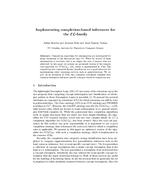Implementing completion-based inferences for the {$\mathcal{el}$}-family
Aus International Center for Computational Logic
Implementing completion-based inferences for the {$\mathcal{el}$}-family
Julian MendezJulian Mendez, Andreas EckeAndreas Ecke, Anni-Yasmin TurhanAnni-Yasmin Turhan
Julian Mendez, Andreas Ecke, Anni-Yasmin Turhan
Implementing completion-based inferences for the {$\mathcal{el}$}-family
In Riccardo {Rosati} and Sebastian {Rudolph} and Michael {Zakharyaschev}, eds., Proceedings of the international Description Logics workshop, volume 745, 2011. CEUR
Implementing completion-based inferences for the {$\mathcal{el}$}-family
In Riccardo {Rosati} and Sebastian {Rudolph} and Michael {Zakharyaschev}, eds., Proceedings of the international Description Logics workshop, volume 745, 2011. CEUR
- KurzfassungAbstract
Completion algorithms for subsumption are investigated for manyextensions of the description logic EL. While for several of them subsumption is tractable, this is no longer the case, if inverse roles are admitted. In this paper we present an optimized version of the completion algorithm for ELIHFR, which is implemented in jCEL. The completion sets computed during classification are a good substrate for implementing other reasoning services such as generalizations. We report on an extension of jCEL that computes role-depth bounded least
common subsumers and most specific concepts based on completion sets. - Forschungsgruppe:Research Group: AutomatentheorieAutomata Theory
@inproceedings{ MeEcTu-DL11,
author = {Julian {Mendez} and Andreas {Ecke} and Anni-Yasmin {Turhan}},
booktitle = {Proceedings of the international Description Logics workshop},
editor = {Riccardo {Rosati} and Sebastian {Rudolph} and Michael {Zakharyaschev}},
publisher = {CEUR},
title = {Implementing completion-based inferences for the {$\mathcal{el}$}-family},
volume = {745},
year = {2011},
}
